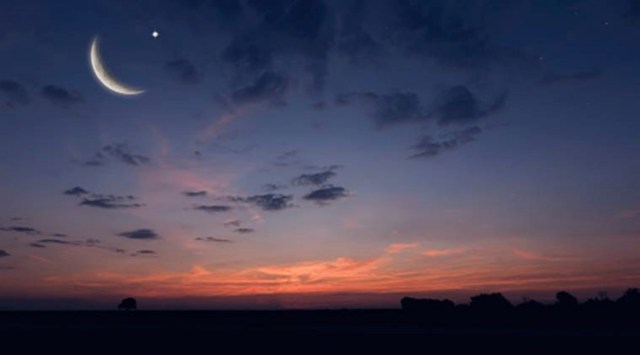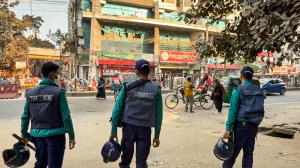Ramzan crescent moon sighting dates divide clergy in J&K
The controversy followed two different announcements made by Kashmir’s Grand Mufti Nasir-ul-Islam and Pakistan’s Central Ruet-i-Hilal Committee over the beginning of Ramzan.
 The “disregard” of Ruet-e-Hilal Committee’s announcement triggered a storm on social media with many trolling the Grand Mufti. Getty images
The “disregard” of Ruet-e-Hilal Committee’s announcement triggered a storm on social media with many trolling the Grand Mufti. Getty images
For the first time in Jammu and Kashmir, announcements over the sighting of the crescent moon on the eve of the holy month of Ramzan have divided Muslims across the Union Territory.
The controversy followed two different announcements made by Kashmir’s Grand Mufti Nasir-ul-Islam and Pakistan’s Central Ruet-i-Hilal Committee over the beginning of Ramzan.
On March 22 around 7.15 pm, the Grand Mufti announced that the first ‘roza (fast)’ of Ramzan will be observed on Friday (March 24) as he had not received any evidence of the sighting of the crescent moon from any part of J&K.
However, a few hours later, around 10.40 pm, Central Ruet-i-Hilal Committee in Pakistan confirmed sighting of the crescent moon and announced the beginning of the holy month from Thursday (March 23).
Before the Grand Mufti could issue a clarification, PDP president and former CM Mehbooba Mufti, at 11.23 pm Wednesday, extended “Ramzan Mubarak” greetings through her Twitter handle.
National Conference vice president and former chief minister Omar Abdullah extended Ramzan greetings via Twitter at 12.16 am, Thursday.
The message spread and mosques across the Valley started calling upon people to come and offer ‘Taraweeh Namaz’ (prayer offered on the nights of Ramzan) before observing the first roza. While many followed, a sizeable number of people who had gone to sleep did not turn up. They followed the Grand Mufti’s announcement that Taraweeh Namaz will be offered on Thursday night.
The announcement of the Grand Mufti of Kashmir coincided with the observance of Ramzan elsewhere in India.
The “disregard” of Ruet-e-Hilal Committee’s announcement triggered a storm on social media with many trolling the Grand Mufti.
To settle the controversy, the Grand Mufti on Tuesday convened a meeting of leading Muslim clergies from various parts of Kashmir at his residence. He said the Ruet-i-Hilal Committee’s announcement was based on the sighting of moon in Peshawar, which was geographically too far from Kashmir.
He announced that Shab-e-Qadr (27th night) will be observed on April 17.
But Muslims in Jammu division did not agree with it, with prominent clergies in Rajouri and Poonch districts announcing Shab-e-Qadr on April 18, in view of the Grand Mufti’s earlier announcement. Without naming the Grand Mufti’s change in stance, Moulana Mohammad Farooq, Imam of Jamia Masjid, Rajouri, said they started observing fast from March 24. As such, the 27th night for them will come on April 18, he pointed out, adding that one cannot change the religious calendar as per one’s convenience.
Grand Mufti Nasir-ul-Islam, when contacted over the phone, said he too had kept the first roza of Ramadan on March 24. Pointing out that he still stands by his announcement about the start of Ramadan month on March 24 as there had been no reports about the sighting of crescent moon anywhere in Jammu and Kashmir on March 22, he said he agreed for Shab-e-Qadr on April 17 only to set at rest the controversy raging over the issue as some vested interests were trying to divide the community.
“However, I had made clear to the ulemas that Eid will be celebrated together in Jammu and Kashmir and for this, they will again start looking for the moon on April 20. If it is sighted on that day, the Eid will be celebrated the next day, otherwise it will fall on April 22,” he said.
“In case the moon is sighted on April 20, then those who have observed Ramadan fast from March 24 as per his announcement will observe one day Qaza (omitted) fast after Eid-ul-Fitr,” he added.
He alleged that without consulting him, even the J&K Wakf Board-run mosques changed their calendar after the announcement by Pakistan’s Ruet-i-Hilal Committee on the sighting of the moon.
The chairperson of J&K Waqf Board, Dr Darakshan Andrabi, said to avoid such confusion in future, J&K, being a Muslim majority UT, shall have its own Ruet-i-Hilal Committee comprising ulemas and scientists from meteorological and space sciences departments for confirming the sighting of the moon. On Waqf Board mosques changing their calendar without consulting the Grand Mufti, she said, “Why should we consult him? He should have contacted us before making the announcement.”







